Because a polyurethane adhesive is very resistant to moisture, so resistant that it is quite possible for the wood to rot and the glue line to remain intact. Because glued wood can be autoclavedat high temperatures and pressures. Because end grain shredders with polyurethane adhesive can be washed in the dishwasher. Because the glued wood can be boiled in water for several hours without falling apart. Because it can be used to obtaining wooden structures used in house construction. I think you already understand that when glued wood needs high resistance, both mechanical and to extreme treatments, a very good choice is polyurethane adhesive. Let's see why it is so strong and how to use it to achieve the desired results.

What is a Polyurethane Adhesive
The liquid adhesive contains urethane groups (obtained, as in polyurethane varnishes, from the reaction of a polyol with an isocyanate) which, through polymerization, form the solid adhesive that binds the elements to be glued. The increased strength comes from the advanced cross-linking obtained from polymerization. Polyurethane adhesives can be bi- or mono-component. In two-component adhesives the reaction is triggered by mixing with a hardener, while one-component adhesives react with moisture in the atmosphere.
WHERE, for what kind of projects is it recommended to use polyurethane adhesives
They can bond wood, metal, ceramics, cork, plastic, stone and other materials. They are used in areas such as furniture and carpentry production, construction, automotive, footwear, flooring and cladding. Due to the high strength of the bond formed, they are mainly preferred in industry, but are also used for DIY projects with special strength requirements. In terms of moisture resistance, polyurethane adhesives are class D4.
There are several types of polyurethane adhesives, each formulated for its field of use. They are white or brown before curing and generally transparent after curing. Those used for gluing wood are very elastic, making them suitable for laying parquet or gluing beams. As the polymerization reaction increases the volume of the adhesive, it can also be used on surfaces with small holes or imperfections, which it fills after expansion. The reaction time can range from 20-30 minutes to hours. After the initial bonding time, when the object is removed from the press, there follows a reaction completion time after which the bond reaches full strength. This can be days.

WHEN to use a Polyurethane Adhesive
As mentioned at the beginning, they are chosen for the very good strength of the bond formed between the bonded elements. Like epoxies, polyurethane adhesives are structural adhesives, but unlike epoxies, they have much better exterior strength. They react even in very humid environments (in water) and the adhesive film resists high temperatures, humidity and pressure.
Choose polyurethane adhesives when you need to:
- High resistance to weather and solar radiation
- High resistance to ageing
- High structural strength
- High impact and shear strength
- Good bonding properties on large surfaces (parquet, floorboards).
Polyurethane wood adhesives are easy to work with, require no special equipment or special conditions and can be used for different surfaces/materials, both indoors and outdoors.
HOW to apply polyurethane adhesives
Mono-component adhesives are mostly used in the wood industry. They are applied at room temperature, the minimum application temperature being, as with PVA adhesives5-10°C. Unlike PVA adhesives, however, they have no special requirements for frost resistance. After applying the adhesive, the elements must be brought into contact. The open phase should not last long because, when reacting, the adhesive has a tendency to increase its volume (it releases carbon dioxide forming a foam). Depending on the type of adhesive, the open phase can be between 10 and 30 minutes.
Apply the adhesive with a brush, roller or spray gun. If one of the elements has become soiled, it can be wiped off immediately with acetone, alcohol or universal thinner. Dry adhesive is easily removed with a scraper, chisel or sanding. For gluing, the elements need to be fixed together with clamps or a press. No great pressure is required, just that the elements are in direct and even contact. The uniform pressure prevents voids which will be filled by expansion of the adhesive. A uniform appearance will result, but the bond will be less strong in the space where the adhesive is expanded.
Their affinity for moisture makes adhesives very sensitive to moisture. The packaging should not be kept open for long periods of time and once opened, the shelf life will be greatly reduced. Do not buy the adhesive in large packages if you do not plan to use it in a short time, as the unused one will harden and will no longer be usable. Moisture in the wood is needed to cure the polyurethane adhesive. Very dry wood will need moisture before application. The moisture preference also makes it difficult to remove from the skin. Wear gloves when working with polyurethane adhesive!

TISZAPUR is a polyurethane adhesive used in the production of strength structures for houses
TISZAPUR D4 4401 Special, distributed by the company Szolvegy from Târgu Mureș, is a highly resistant polyurethane adhesive that can be used to make beams and posts used in the construction of wooden frame houses. It has proven its qualities over time and has been used for more than 15 years by house builders Dimmer in laminated wood structures. High impact and shear strength, high elasticity make the resulting structures very strong and elastic at the same time. It is the kind of glue that outlasts glued wood.
The adhesive is one-component, brown, becoming transparent after polymerization. The quantity applied must not exceed 250 g/m². The curing time in the press is between 8 and 12 hours, depending on the quantity applied. After removal from the press, the panels should be left for 24 to 48 hours to allow the reaction to finalize. After this time the bonding reaches full strength.
Tiszapur D4 Special can be used to obtain outdoor furniture or fittings, the beams and supporting structures of houses, the gluing of wood to be autoclaved, the gluing of parquet flooring and stair treads, the gluing of boats or elements immersed in water. In the case of autoclaving, a period of at least 7 days is recommended between leaving the press and the start of the temperature and pressure treatment.
Polyurethane adhesives are the safe choice when wood has to withstand high pressures and shear forces, the aggressive action of permanently damp environments or the degrading action of UV radiation. When there are no special requirements, even in damp environments such as bathrooms or kitchens, PVA adhesives remain the most suitable adhesives for gluing wood.










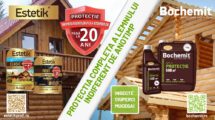


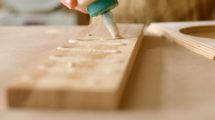

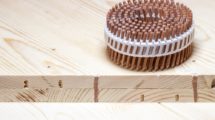


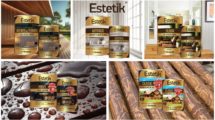
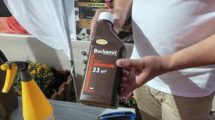









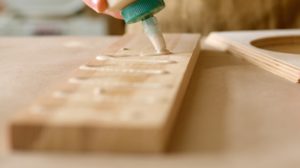
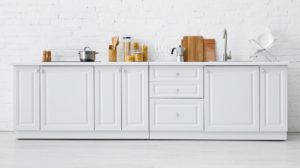


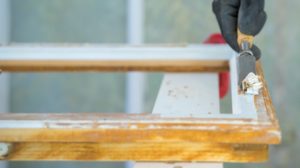



Can you tell us if this polyurethane is harmful to humans if a house is built from wooden beams encased with it?
Hello!
It is not harmful. After hardening it becomes totally inert and is not dangerous.
All the best!